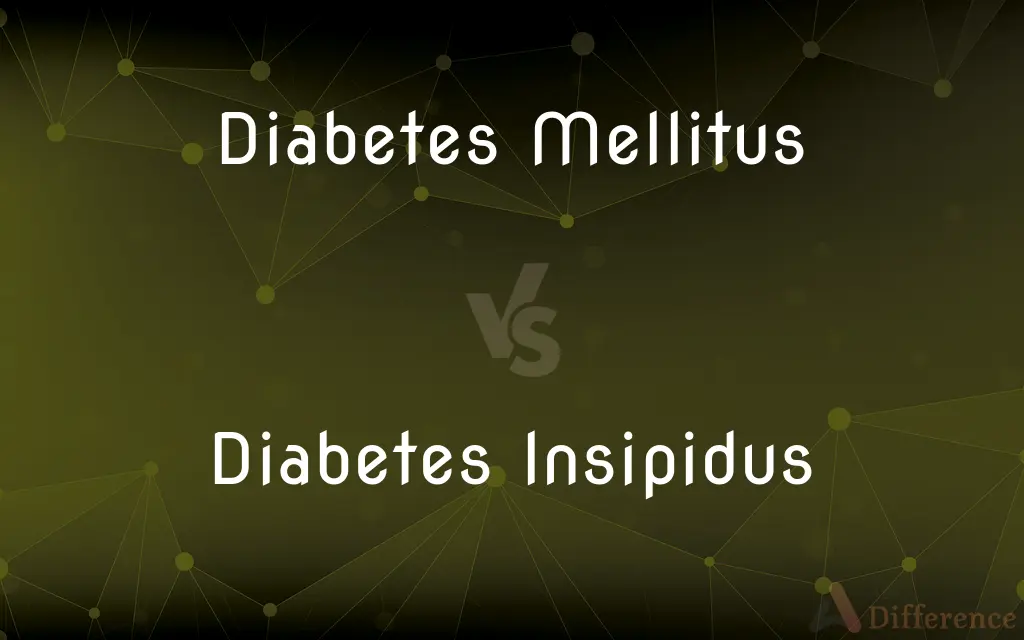Diabetes Mellitus vs. Diabetes Insipidus — What's the Difference?
By Tayyaba Rehman & Fiza Rafique — Published on September 26, 2024
Diabetes Mellitus is a metabolic disorder characterized by high blood sugar levels due to insulin issues, while Diabetes Insipidus involves a lack of balance in water regulation, leading to excessive urination and thirst, unrelated to blood sugar.

Difference Between Diabetes Mellitus and Diabetes Insipidus
Table of Contents
ADVERTISEMENT
Key Differences
Diabetes Mellitus (DM) is primarily concerned with the regulation and metabolism of glucose in the body. It arises either due to insufficient insulin production (Type 1 DM) or the body's inability to effectively use the insulin it produces (Type 2 DM). The hallmark symptoms include high blood sugar, increased thirst, frequent urination, and unexplained weight loss. Management typically involves diet, exercise, monitoring blood sugar levels, and insulin or other medication.
Diabetes Insipidus (DI), on the other hand, is a rare condition that affects the body's water regulation processes. It's characterized by the kidneys' inability to conserve water, leading to excessive urination and, consequently, intense thirst. DI can be caused by an insufficiency of the antidiuretic hormone (ADH) or by the kidneys' inability to respond to ADH. Treatment usually focuses on addressing the underlying cause and may include hormone replacement therapy.
DM deals with glucose metabolism and is more common, affecting a significant portion of the population worldwide, while DI is concerned with water balance and is relatively rare. The symptoms of excessive thirst and urination overlap in both conditions, but their causes and treatments differ markedly.
DM can lead to various complications if not managed properly, including cardiovascular disease, kidney damage, and vision problems. DI's main risks revolve around dehydration and the potential imbalance of electrolytes. Monitoring and managing either condition require medical guidance, but the approach differs significantly, reflecting the underlying causes of each.
Despite their similar names, Diabetes Mellitus and Diabetes Insipidus are fundamentally different conditions. The former involves insulin and glucose metabolism, while the latter deals with water balance and kidney function. Understanding these differences is crucial for effective treatment and management.
ADVERTISEMENT
Comparison Chart
Primary Concern
Glucose metabolism
Water balance regulation
Symptoms
High blood sugar, increased thirst, frequent urination, weight loss
Excessive urination, intense thirst
Causes
Insufficient insulin production/use
Lack of ADH production/response
Treatment
Diet, exercise, blood sugar monitoring, medication
Addressing underlying cause, hormone therapy
Complications
Cardiovascular disease, kidney damage, vision problems
Dehydration, electrolyte imbalance
Prevalence
Common
Rare
Compare with Definitions
Diabetes Mellitus
A condition where blood sugar levels are persistently high.
Managing diabetes mellitus often requires daily insulin injections.
Diabetes Insipidus
Characterized by the inability to regulate water balance.
Diabetes insipidus requires careful monitoring of fluid intake and output.
Diabetes Mellitus
Managed with a combination of medications, lifestyle changes, and monitoring.
A balanced diet is crucial for managing diabetes mellitus.
Diabetes Insipidus
Can be treated with hormone replacement therapy.
Desmopressin is often used to treat central diabetes insipidus.
Diabetes Mellitus
Symptoms include excessive thirst and urination.
Frequent urination at night may be a sign of uncontrolled diabetes mellitus.
Diabetes Insipidus
Not related to blood sugar levels.
Despite its name, diabetes insipidus does not involve glucose metabolism.
Diabetes Mellitus
Can be classified into Type 1 (autoimmune) and Type 2 (lifestyle-related).
Type 2 diabetes mellitus can often be managed with diet and exercise.
Diabetes Insipidus
Requires diagnosis to rule out other causes of excessive urination.
A water deprivation test may be used to diagnose diabetes insipidus.
Diabetes Mellitus
Leads to increased risk of heart disease and kidney failure.
Regular monitoring can help prevent complications associated with diabetes mellitus.
Diabetes Insipidus
Results in excessive urination and thirst.
Individuals with diabetes insipidus may drink and urinate several liters a day.
Common Curiosities
Can Diabetes Mellitus and Diabetes Insipidus have similar symptoms?
Yes, both can present with excessive thirst and urination, but the causes and treatments are different.
Can Diabetes Insipidus lead to high blood sugar?
No, Diabetes Insipidus does not affect blood sugar levels; it's a condition related to water balance.
What lifestyle changes are recommended for managing Diabetes Mellitus?
Healthy eating, regular physical activity, weight management, and blood sugar monitoring are key.
Is Diabetes Mellitus more common than Diabetes Insipidus?
Yes, Diabetes Mellitus is significantly more common and well-known than Diabetes Insipidus.
Can children develop Diabetes Insipidus?
Yes, children can develop Diabetes Insipidus, and it requires careful management to ensure proper hydration and growth.
How are Diabetes Mellitus and Diabetes Insipidus diagnosed?
Diabetes Mellitus is diagnosed through blood tests measuring sugar levels, while Diabetes Insipidus diagnosis may involve water deprivation tests and ADH levels assessment.
What is the role of insulin in Diabetes Mellitus?
Insulin helps regulate blood sugar levels, and its insufficient production or use is a key issue in Diabetes Mellitus.
Is there a cure for Diabetes Mellitus or Diabetes Insipidus?
While there is no cure for Diabetes Mellitus, it can be managed effectively with treatment. Some forms of Diabetes Insipidus can be treated depending on the underlying cause.
What is the main difference between Diabetes Mellitus and Diabetes Insipidus?
Diabetes Mellitus relates to high blood sugar levels due to insulin issues, while Diabetes Insipidus involves problems with water balance, leading to excessive thirst and urination.
Are there different types of Diabetes Insipidus?
Yes, there are central, nephrogenic, gestational, and dipsogenic types, each with different causes.
How important is water intake for someone with Diabetes Insipidus?
Extremely important; maintaining hydration is crucial due to the excessive loss of water.
Can diet affect Diabetes Insipidus?
While diet doesn’t directly affect Diabetes Insipidus, proper nutrition can help manage symptoms and overall health.
What are the long-term risks of unmanaged Diabetes Mellitus?
They include cardiovascular disease, kidney failure, vision loss, and nerve damage.
Can Diabetes Insipidus be a temporary condition?
Yes, gestational diabetes insipidus is temporary and occurs during pregnancy.
Is medication always required for Diabetes Mellitus management?
Not always for Type 2; lifestyle changes can sometimes sufficiently manage it, but Type 1 requires insulin.
Share Your Discovery

Previous Comparison
On-road Diesel vs. Off-road Diesel
Next Comparison
Direct Addressing Mode vs. Indirect Addressing ModeAuthor Spotlight
Written by
Tayyaba RehmanTayyaba Rehman is a distinguished writer, currently serving as a primary contributor to askdifference.com. As a researcher in semantics and etymology, Tayyaba's passion for the complexity of languages and their distinctions has found a perfect home on the platform. Tayyaba delves into the intricacies of language, distinguishing between commonly confused words and phrases, thereby providing clarity for readers worldwide.
Co-written by
Fiza RafiqueFiza Rafique is a skilled content writer at AskDifference.com, where she meticulously refines and enhances written pieces. Drawing from her vast editorial expertise, Fiza ensures clarity, accuracy, and precision in every article. Passionate about language, she continually seeks to elevate the quality of content for readers worldwide.













































